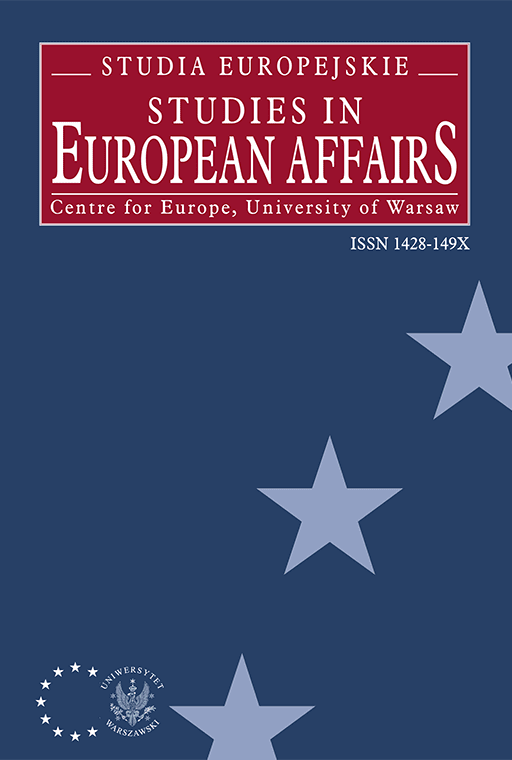
ISSUE: 3/2012
- Volume 63
- Number 3
- 2012
Subscribe NEWSLETTER
Studia Europejskie –
Studies in European Affairs
ISSN: 1428-149X
e-ISSN: 2719-3780
License
Articles published in the journal are under a Creative Commons Attribution – Non Commercial – No Derivatives 4.0 International License
Polityka śródziemnomorska Unii Europejskiej wobec zjawiska arabskiej wiosny
Mediterranean Policy of the European Union in View of the Arab Spring
Abstract
The article is dedicated to the Mediterranean policy of the European Union in view of the phenomenon of the ‘Arab Spring’ and is divided in two parts. The first part characterises the process of development of the EU’s Mediterranean policy, starting with the 1970s, when the EEC’s Global Mediterranean Policy
was initiated, followed by a description of the establishment of the Renewed Mediterranean Policy in the early 1990s and a detailed analysis of the EuroMediterranean Partnership initiated in 1995 in Barcelona, which set the key objectives of cooperation in this region between the European Union and the countries of Northern Africa and the Middle East for many years to come. The author has paid particular attention to the latest initiatives of the European Union regarding the countries of the Mediterranean Region, that is the European Neighbourhood Policy and the Union for the Mediterranean of 2008. The second part contains a critical analysis of the EU’s Mediterranean policy in the context of the emergence of the Arab Spring process. The main objective pursued by EU politicians was economic expansion of the European countries aimed at obtaining selling markets for industrial goods in Northern Africa while blocking imports of agricultural products from the Arab countries. Another important goal was to thwart the illegal immigration to Europe from this region. It is due to these two objectives that the European Union tolerated the authoritarian regimes in the Arab states. However, it turned out that there is no consent for the existence of these regimes in the societies of the countries of the Mediterranean south, which culminated in the Arab Spring. As a result of this, the EU’s Mediterranean policy was compromised and proved an ignominious fiasco. The EU still has no vision for and has not developed any new coherent policy towards this region, which proves the helplessness of European politicians and the gradual degradation/erosion of the role of the EU as a global superpower.
Language: Polish
Pages: 29-49
How to Cite:
Harvard
Adamczyk, A. (2012) "Polityka śródziemnomorska Unii Europejskiej wobec zjawiska arabskiej wiosny". Studia Europejskie – Studies in European Affairs, 3/2012, pp. 29-49.